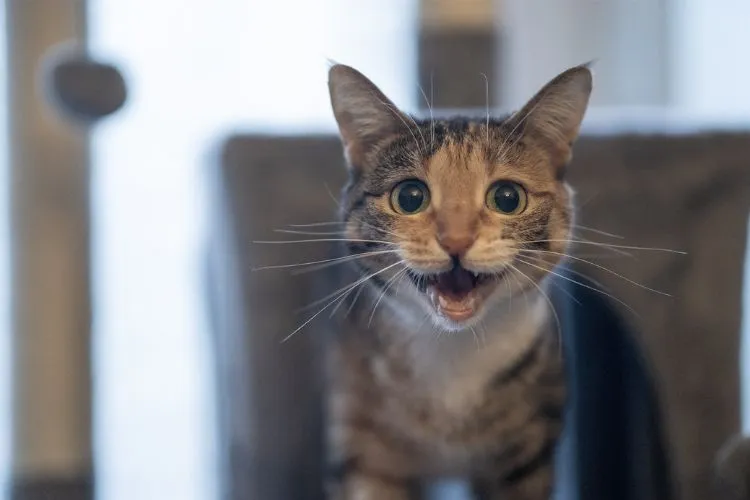Cats are mysterious creatures, often ‘speaking’ to us through an array of vocalizations.
While meows, purrs, and hisses are familiar to most cat owners, the occasional squeak can leave us perplexed.
Even I used to wonder why is my cat squeaking, and talked with many fellow cat owners to know the reasons.
Then I decide to understand these rarer sounds, because it can really give us insight into the whimsical world of our feline friends.

🐾 Understanding Cat Squeaks: An Overview
The squeak of a cat is a soft, high-pitched sound that seems to question or call out. It is different from the more demanding meow, the contented purr, or the aggressive hiss.
Cats use these softer vocalizations in specific situations. Listening closely to the squeaks can tell us a lot about what our cat may be thinking or feeling.
🐾 Why Is My Cat Squeaking?
Seeking Attention
Cats are experts at getting their owners’ attention, and one way they do so is through squeaking.
This sound is often short and sweet, used when your cat wants a cuddle or playtime. It’s their way of saying, “Hey, look at me!”
Expressing Curiosity or Interest
When exploring, cats may let out high-pitched squeaks. The sound can signal to its owner or other cats that something has caught its interest.
During playtime, these sounds reflect an integral part of their hunting instincts.
Showing Contentment or Pleasure
Not all cats are loud purrers; some express their happiness with soft squeaks. If your cat squeaks while being petted, it’s likely a sign of its enjoyment.
This can be akin to the gentle chirrup some cats make when they greet their owners.
Expressing Hunger or Desire for Food
Squeaking can indicate hunger. If the squeaks tend to occur around feeding time, your cat is likely telling you that it’s time to eat. Recognizing hunger squeaks helps ensure your cat is fed on time.
🐾 Other Causes of Cat Squeaking
Health-Related Issues
At times, a squeak can signal discomfort or pain. Respiratory issues could change your cat’s voice. If squeaks are accompanied by changes in behavior or appetite, a vet visit is crucial.
Breed-Specific Tendencies
Some breeds have a natural predisposition for making unique sounds. Siamese cats, in particular, are known for their distinct vocal patterns, which can include squeaks.
🐾 How to Respond to Your Cat’s Squeaks

It is essential to learn what our cat’s squeaks mean so we can respond correctly. Positive reinforcement like petting or treats can reinforce good behavior.
If squeaking for attention becomes excessive, understanding the need behind the sounds helps address it without negative reinforcement.
🐾 Keeping a Healthy Communication With Your Cat
Understanding your cat’s squeaks is part of a larger picture of healthy communication. Regular veterinary visits ensure vocal health remains a priority. Engaging with our cats through play and affection also keeps them active and content.
🐾 The Science Behind the Squeak
Cats possess a unique vocal apparatus compared to other mammals, which allows a wide range of sounds. The larynx, or voice box, is extremely flexible, enabling everything from purrs to squeaks.
Psychologically, cats use these sounds strategically to communicate needs and emotions effectively, adapting their vocalizations to their social environment.
🐾 Cat Breed Profiles: Vocal Characteristics
Siamese

Renowned for their vocal range and loudness, Siamese cats are the quintessential “talkative” cats.
These sleek beauties don’t just meow; they have a vast array of vocalizations, from melodious meows to distinctive squeaks.
Their vocalizations are not mere sounds; they are a means of communicating specific needs and desires to their human companions.
A Siamese cat’s squeak can often be a call for attention, an expression of curiosity, or even a form of greeting. Their vocal nature is matched by their social and affectionate demeanor, making them one of the most communicative breeds in the feline world.
Maine Coon
Maine Coons, one of the largest domestic cat breeds, are known for their gentle dispositions and surprisingly soft voices.
Despite their size, their vocalizations tend to be more subtle, including chirps, trills, and soft squeaks, especially when soliciting attention or initiating play.
These gentle giants use their unique vocal patterns to express contentment, to invite interaction, or simply to “chat” with their humans.

The Maine Coon’s array of sounds adds a charming dimension to their already endearing personality, proving that even the largest cats have soft, subtle ways of speaking their minds.
Bengal

Bengals are vocal cats with a rich vocabulary.
While they do share the common feline chirps, meows, and purrs, Bengals are also known for producing squeaks, especially when they’re excited or intrigued.
Their vocalizations can be seen as an extension of their energetic and playful nature, often used to express a wide range of emotions from happiness to anticipation of play or feeding.
Bengal cats are not shy about using their voices to communicate, making their desires and feelings well known to their human families.
These profiles illuminate the diversity and complexity of feline vocal expressions, showcasing how different breeds use squeaks and other sounds to communicate with their human companions and the world around them.
🐾 Frequently Asked Questions (FAQs)
Cats have a repertoire of sounds, and squeaking is simply another part of their vocal expression.
Yes, sometimes squeaking can indicate distress or discomfort, especially if coupled with unusual behavior.
Look for other symptoms like changes in eating habits or lethargy, and consult a veterinarian.
Breeds like the Siamese are more prone to making distinctive vocalizations, including squeaking.
Respond appropriately by assessing the need behind the squeak—whether it’s attention, food, or play—and proceed accordingly.
Conclusion:
Cat squeaks are just one of the many sounds these fascinating creatures make. Listening and learning can deepen the bond we share with our furry companions.
